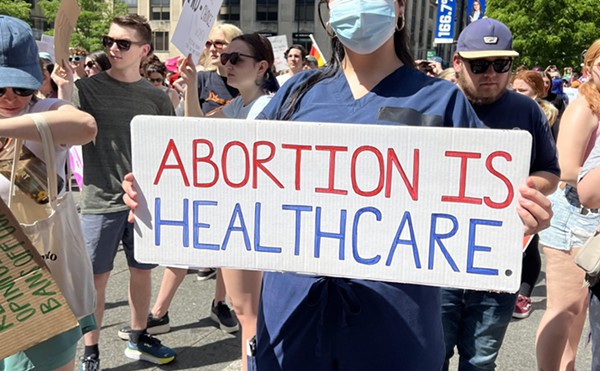|
Almost everyone in Iran has lost family to the Iran-Iraq War. It spanned all but the last two years of the 1980s, and its footprints weigh heavily on how Iranians view tensions with the West.
Mahi Sadeghi, an American of Iranian descent, says Iranians are prepared, at least emotionally, for war with the United States. Iran has a large number of citizens under 30 who are willing and able to go to war.
"One of the saddest things I've heard is to hear my cousins say that they would sign up," she says.
Sadeghi lost two uncles in the Iran-Iraq war. She says Iranians are very nationalistic and, even though they don't like the current Iranian regime — she says, for instance, that most Iranians view President Mahmoud Ahmadinejad's denial of the Holocaust as outrageous — they hate the idea of an American occupation even more.
Sadeghi is providing the Iranian perspective at Conversations for Peace, a panel discussion on the Iraq War, on Saturday at the Art Academy. It's part of the fifth annual S.O.S. Art exhibition, which explores peace and justice themes through visual and performance art.
The idea is to hear from people with first-hand experience in the Middle East, according to S.O.S. Art founder Dr. Saad Ghosn.
even organizer Michelle Goldman, who will moderate the discussion, is originally from Israel. Representing other points of view are speakers with Iraqi, Syrian and American perspectives.
A lot of people in the West think of one Muslim country as being interchangeable with any other, Sadeghi says.
"Iran isn't Iraq," she says. "Iran isn't Saudi Arabia."
She describes Iran as an enlightened state with a liberal population, a pluralistic society with an active women's movement and even state-funded sex-change operations.
Former congressional candidate Thor Jacobs offers an American angle on the panel. His grandparents are from Syria. He has traveled extensively in the Middle East and earned a degree at the University of Beirut.
"Most Americans don't realize how destructive our (foreign) policy is and has been," Jacobs says. "We need an enlightened foreign policy that simply recognizes the underlying issues that contribute to extremism."
As it stands, we only treat the symptoms of radicalism and we use our military as the only negotiating tool, he says. Jacobs says this crafts a vicious cycle.
"You're not going to reduce Palestinian radicalism by visiting more violence on an already radicalized, traumatized people," he says. "It just pours gas on the fire."
The issue to be addressed is that there isn't democracy in these countries, and economic opportunities are few and far between. Dictatorial regimes, often propped up by the United States, prevent a free market economy from flourishing because it threatens their power. As a result, the people are, "pissed off, want to blame somebody and don't have a lot to live for," Jacobs says.
"People with jobs aren't keen on blowing themselves up," he says. "People who can get married, find a job and have a family aren't keen on blowing themselves up."
Ghosn hopes for an engaging, thoughtful dialogue. People too often have positions that are based on dogma or lack of knowledge, he says.
This is the third installment of Conversations for Peace in the past year. Previous panels explored the Lebanon conflict last summer and the situation in the West Bank. Ghosn wants the program to become a regular event. More than 100 people attended the last Conversation for Peace, he says.
"We asked people to come and represent their personal experience to set the tone and connect with other people," he says. "What's really different is that it's not an academic or ideological conversation."
Although all of the scheduled speakers are peace activists, divergent points of view are welcome, and participants have an opportunity to interact with the panelists, Ghosn says. Including a pro-war speaker on the panel would degrade the discourse into a counterpoint style match and nothing would really get done, he says.
The regional impact of the war, how neighboring populations are dealing with it and diplomatic solutions will all be parts of the conversation.
Ghosn says the speakers function as first-person witnesses to the ongoing crises, and he wants to move beyond the dogma, nationalism and religious issues that cloud the road to peace. Ultimately, he says, the aim is to find better diplomatic solutions.
Conversations for Peace is from 7-9 p.m. May 26 at the Art Academy of Cincinnati in Over-the-Rhine. Admission is free.





